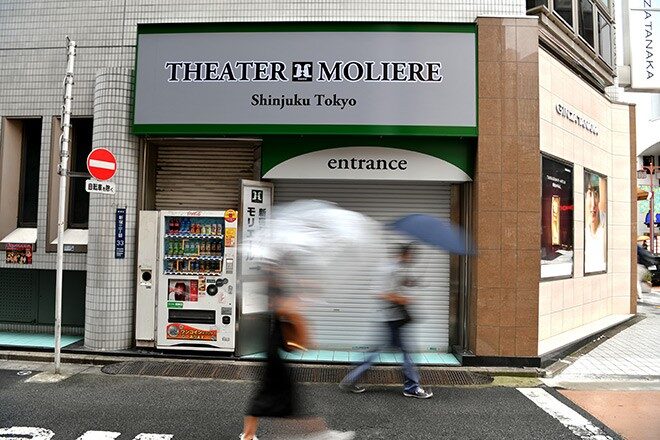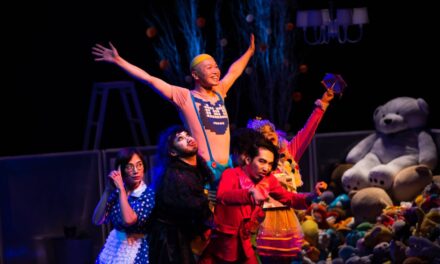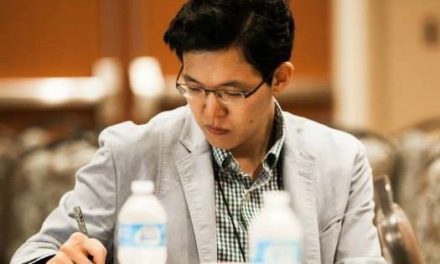This past week, health officials called for more than 800 theatergoers to be tested for COVID-19 after at least 59 cases were traced back to performances of a play titled Werewolf in Tokyo’s Shinjuku Ward.
That was, of course, very bad news for those directly affected, but also for all the playwrights and directors who have been scrambling to experiment with different methods of keeping Japan’s theater scene alive after a shutdown of more than three months. Although many have chosen to stream performances online, that solution has been met with mixed opinions.
Kenichi Tani, 38, who is the founder of the Dull-Colored Pop theater company and winner of 2019’s prestigious Kishida Kunio drama award, says his experience with online platforms has been less than ideal.
At a studio in Tokyo as he rehearsed his latest work, Anti-Fiction, Tani says,
“I was planning a month-long theater festival in May, but it was canceled due to COVID-19. Then in April, I worked with some close colleagues to stream a piece online but I didn’t enjoy it at all. I realized I wasn’t interested in making theater for screen-viewing.”
That left Tani in a spot where he had to either do something he didn’t enjoy or simply wait for things to go back to normal. “I instantly had nothing to do, even after working in the theater world for the past 23 years,” he says. “It was as if I went blank.”
Tani says he began to feel the pressure to use his sudden abundance of free time to create new plays for the future, but he got stuck.
“In this climate of fear, I wasn’t able to write fictional stories about romance or even personal torment,” he says. “The only theme I could latch onto was that of the current situation.”
So, Tani decided to draw on the “climate of fear” by writing a piece about a writer who is plunged into a sudden slump, much like his own. Anti-Fiction is a decidedly first-person account of his experience, as he is not only the director and sole actor, but he also did the lighting design and sound effects.
While Anti-Fiction is now playing — with redoubled hygiene protections in light of the Werewolf outbreak — at Theater Fuusikaden in Shinjuku Ward, Tani also live-streamed two performances on July 16 and 26. “Each of the 14 times I am on stage in Anti-Fiction, I will be exploring what the so-called new normal requires,” he says, adding that for safety reasons the theater is limited to 50 percent capacity. By charging viewing fees for the two live-streamed performances, however, he is hoping to make up for the loss in ticket sales.
“I don’t get it, but my wife and her parents are looking forward to seeing the play online this time, and it’s true that our child can enjoy it with his mom at home. I suppose online theater may be a useful tool for some people — except me,” he concludes with a laugh.
Suguru Yamamoto, 33, is the founder of the Hanchu-Yuei theater company based in Tokyo. Having recently spent six months in New York to study drama after being awarded a grant by the Asian Cultural Council, he had just returned to Tokyo in February when the theater shutdowns began.
In response, Yamamoto launched an original series of 10- to 15-minute theater sketches on YouTube titled Banana no Hana (Banana Flower).
The series follows the ups and downs of a con man who uses the handle “Anagura no Kusatta Banana” (Rotten Banana in the Cellar) to chat with a woman online. It turns out, however, that the woman is actually a man who is catfishing him.
As to why he is shifting his focus to an online project, Yamamoto says,
“YouTube is a very familiar media platform for young people. If someone wants to go and see theater live, they’ll have to spend around ¥3,000 on a ticket, and pay to get there and back on top of that.”
“Of course, I understand the true joy of live events, but I think the times have been changing day by day and the Japanese theater world has a weak sense of crisis when it comes to catching up with the times, such as digital ticket-sales systems and open auditions for performers. In many ways, it’s still very conservative.”
When confronted with the prospect of not being able to perform live, Yamamoto says he saw it as a great opportunity for Japanese theater to break with many fixed traditions.
“I hope to help inspire Japan’s theater world both to overcome the effects of this pandemic and to propel our contemporary theater more toward the forefront of popular culture as it is in most other developed countries,” he says. “For example, though we don’t have as many viewers yet compared with other YouTube posts, about 20,000 people have watched Hanchu-Yuei’s previous works — and many theater companies would be delighted to have an audience of 2,000 at their production. Why aren’t people recognizing that online platforms offer bright possibilities?”
However, while acknowledging Yamamoto’s optimism, Tani made a compelling case for “actors and audiences to share the same space at the same time. The theatre is a spatial art, so it is important that people see the performance right before their eyes.”
“Theater has no definition,” Yamamoto counters. “If someone calls something theater, then it will be theater.”
“From as far back as ancient Greece, and even in kabuki, theater began in fields and other open spaces. The late avant-garde drama and arts icon Shuji Terayama staged some of his experimental performances in the middle of a town (Asagaya in Tokyo’s Suginami Ward) in the 1970s. So why can’t we have theater watched on a screen via an online platform?”
In other times, these creators’ exchange could make for an interesting debate in a downtown cafe, but this one is being held under more desperate circumstances. Tani believes it will take “a lot of trial and error” to find the most effective way to capture what dramatists love about the stage and present it during restrictive conditions.
Yamamoto, however, says: “I will continue with online theater alongside my regular on-stage works even after the pandemic has ended. The most important thing is whether my creations are resonating with today’s society.”
Though their approaches may differ, their underlying devotion to their art is the same: Theater is their life’s work and their passion, and they won’t give up on it anytime soon.
This article was originally posted to www.japantimes.co.jp on July 17, 2020, and has been reposted with permission. Read the original here.
This post was written by the author in their personal capacity.The opinions expressed in this article are the author’s own and do not reflect the view of The Theatre Times, their staff or collaborators.
This post was written by Nobuko Tanaka.
The views expressed here belong to the author and do not necessarily reflect our views and opinions.




















